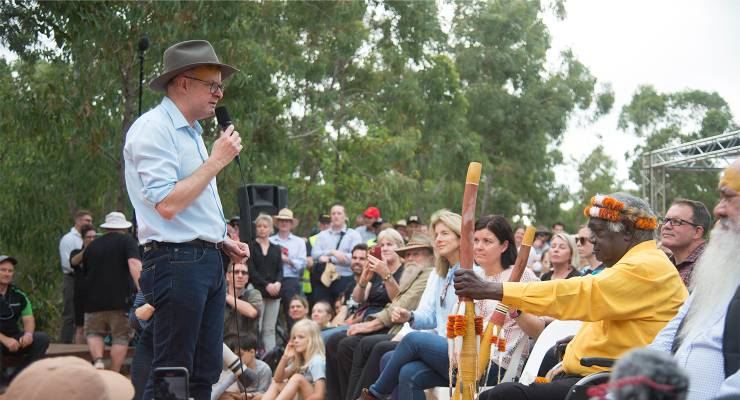
There are many impediments to the lives of Indigenous peoples that need addressing, as documented in Closing the Gap reports and numerous other findings into how to achieve equality for Aboriginal and Torres Strait Islander peoples.
Prime Minister Anthony Albanese is correct that “we need to do something different” to fix these problems and to “recognise and consult” with a broad range of Indigenous representatives.
This should unite the great majority of Australians. With regards to the government’s proposal for an Indigenous Voice to Parliament, lawyer and land rights activist Noel Pearson once set 90% as the benchmark for the popular support needed for constitutional recognition. As Albanese said on Saturday, “This should be the moment we come together as a nation.”
So why are we so divided?
Opinion polls show a narrow but gradually shrinking majority in favour of the Voice, but this could quickly change. Historically, as the referendum date gets closer, support tends to dwindle — only 8 out of 44 referendums have succeeded in Australia.
It would be a disaster for reconciliation and Australia if the Voice referendum is voted down, but that’s the way we seem to be heading.
Constitutional amendment is serious. Critics of the government’s proposal are shouting that it will result in something profoundly undemocratic and undermine parliamentary sovereignty. Opposition Leader Peter Dutton, for example, has repeatedly asked for more detail, which the government has said will come when the legislation is introduced after the referendum.
However, the most important matters can and should be put in the referendum wording to be approved by the Australian people.
Noel Pearson made the analogy of deciding to build a bridge over Sydney Harbour with the design and construction to come later. However, before approving the bridge, people voting on it must, of course, know that the bridge proposed will be functional, safe and elegant. It is hubris to ask for approval to build a big bridge without these bases covered.
The wording of the government’s referendum proposal is far too vague for comfort. We have been assured many times by the advocates of the Voice that it’s going to be a “grassroots megaphone”, “consultative only and not a third chamber”, and “focused on practical outcomes”. Critics of the proposal vehemently disagree.
The referendum could be successfully passed if four changes are made to the words of the proposed constitutional amendment.
‘Grassroots megaphone’
Add the words: “the members of the Voice are to be democratically elected by Indigenous peoples at a local level”. Democracy is a British gift to Australia of which we can all be proud, one that provides transparency and accountability. It would scuttle the referendum if there were any suggestion the members of the Voice were to be chosen behind closed doors by political elites to fit with their opinions.
‘Consultative only and not a third chamber’
Add the words “the Voice’s role is to be purely advisory only and the provision of that advice is not to be justiciable by the courts”. This will make it clear the Voice is not a third chamber to be “feared and revered” with a de facto veto. It also makes it clear there will not be the “lawfare” that some critics have foreshadowed.
‘Focused on practical outcomes’
Add the words: “the Voice is to be focused on practical outcomes that improve the lives of Indigenous peoples”. This will laser the Voice on paramount issues. It would be a tragedy for Australia if the Voice became just a platform for grandstanding political activists rather than helping to Close the Gap.
‘Voices’
Finally, change the proposal’s name to “Voices”, plural. There is a fundamental error in the current proposal calling it the singular “Voice” when it comprises many different Indigenous voices. Just as one obvious example, the 18% of Indigenous peoples who live in remote communities have very different issues from the 82% who don’t. Indigenous voices are not a monolithic “Voice”.
The government will wear the blame if these small but important changes are not dealt with in the wording of the referendum proposal itself. Far better to delay the referendum a bit and get it right with strong support than risk a bitterly divided country by pushing a hubristic proposal.
Do you think the referendum proposal for the Voice needs tweaking? Let us know by writing to letters@crikey.com.au. Please include your full name to be considered for publication. We reserve the right to edit for length and clarity.








How odd. Is that really a good idea and who was consulted? Various Indigenous people have been at pains to point out the same thing as a reason they reject it: selecting representatives by ‘democratic election’ is a British gift to Australia, and not part of their culture. However, if that is in fact what Indigenous people want, then let’s do it.
A disastrous suggestion that would surely kill the proposal. It is certainly true there are many different Indigenous voices, and the proposed body would have to include enough of them to be truly representative. But when it speaks to Parliament it would need to present its conclusions or consensus following its internal debate and consultation; it must be a Voice. If it cannot do that, if it is only going to provide a babble of many opinions, contradictory and incoherent, it is worse than useless. It provides nothing we do not have already.
Apart from his history of working with the Corporate Bandits, don’t forget that the author is the nephew of premier Ted, and a close personal friend of He Who Must Not Be Named………..
…………………..so maybe this is just a teaser of how the RWNJs will attempt to derail the Voice.
Divide and Conquer………..
……..ain’t it always the way.
Indeed. The record of McKinsey & Co is consistently appalling and as a rule of thumb any opinion, proposal or recommendation from that source or anyone associated with it should be treated as pure poison. Management consultants have a bad reputation generally, but McKinsey truly excels.
When is the design of a bridge prepared before the NEED for the bridge is determined.
In every case the design and then cost must be estimated before proceeding with any project. Of course we need some sort of voice but the design is critical before writing it into the constitution. An excellent article (except maybe the last suggestion). I will happily support the proposal if these are included
Anyone who named their son “Atlas” has a close personal relationship with Hubris…………………………..
I thought the close personal relationship was with Clymene
If the almost irrelevant Dutton stopped trying to score cheap political wins against Albanese, this would get up in a heartbeat. The original premise for the constitutional amendment was dead simple.
the parliamentary debate later will sort the legislation. What’s to object to here?
Of course the Cats said NO even before any wording had been tabled. WHY? What are they scared of? That all farms will suddenly be owned by First Nations people?
You meant ‘Nats’, didn’t you?
Indeed
at first read, I thought these might be reasonable suggestions. Upon reflection it is clear they are all just red-herrings, presumably designed to create noise and concern. None of them are vaild issues or useful solutions. I wonder exactly who the author is and what his agenda is …
I agree with your conclusion, this looks more like a wrecking intervention than anything constructive. Some sort of answer to your queries about the author are at the foot of the piece, ‘About the author’.